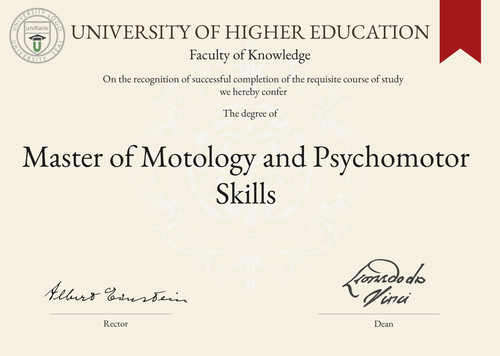
Master of Motology and Psychomotor Skills (MMPS)
Guide to Master of Motology and Psychomotor Skills Program/Course/Degree
Master of Motology and Psychomotor Skills (MMPS)

Program Name:
Master of Motology and Psychomotor SkillsProgram or Degree abbreviation:
MMPSDuration range:
Varies by country and universityTuition range:
Varies by country and universityOverview:
The Master of Motology and Psychomotor Skills program is designed to provide students with a comprehensive understanding of the principles and practices related to motology and psychomotor skills. This program focuses on the study of human movement, motor development and the application of psychomotor skills in various contexts.Curriculum Overview by year:
The curriculum of the MMPS program is structured to cover a wide range of topics related to motology and psychomotor skills. The coursework is typically divided into different modules or subjects, which are spread across the duration of the program. The specific curriculum may vary depending on the country and university chosen for study.Key Components:
The key components of the MMPS program include theoretical knowledge, practical skills development, research methodology and hands-on experience in various motology and psychomotor settings. Students will gain a deep understanding of motor control, motor learning, assessment and intervention techniques and the application of psychomotor skills in different populations.Career Prospects:
Graduates of the MMPS program can pursue a variety of career paths in fields such as sports coaching, physical therapy, occupational therapy, rehabilitation centers, research and academia and performance enhancement. They can work with individuals of all ages and abilities to improve motor skills, enhance performance and promote overall well-being.Salary Expectations:
The salary expectations for graduates of the MMPS program can vary depending on factors such as the chosen country, the specific job role and the level of experience. Generally, professionals in this field can earn competitive salaries, with the potential for growth and advancement over time. For a more accurate understanding of salary expectations, you can utilize the Job Sites Search Engine, from our sister site jobRank, which searches over 4,600 job sites worldwide. Make sure to specify not only the job title but also the country you are interested in.Conclusions:
It is important to note that the duration, tuition fees, curriculum, key components, career prospects and salary expectations of the Master of Motology and Psychomotor Skills program can vary depending on the country or location chosen for study, as well as the university offering the program. Prospective students are encouraged to research and compare different options to find the program that best suits their needs and goals. Visitors can search for where this specific degree (MMPS) is offered anywhere in the world through the uniRank World Universities Search Engine, which provides comprehensive information on universities and programs worldwide.World Universities Search Engine
search for Master of Motology and Psychomotor Skills (MMPS) and add the Location (country, state etc.) or specific University you are interested in studying at.
Query examples:
- Master of Motology and Psychomotor Skills (MMPS) United States
- Master of Motology and Psychomotor Skills (MMPS) United Kingdom online
- Master of Motology and Psychomotor Skills (MMPS) Australia international students
- Master of Motology and Psychomotor Skills (MMPS) University of California
- Master of Motology and Psychomotor Skills (MMPS) University of London tuition fees
- Master of Motology and Psychomotor Skills (MMPS) University of Sydney scholarships
Share Program/Course
Interesting? Share this program/course/degree info with your friends now.